
Related
The United Nations is warning the risk of mass starvation is rapidly rising in Yemen, Nigeria, Somalia and South Sudan. This comes as the U.S. escalates its involvement in the Saudi-led war on Yemen. We speak to Kathy Kelly, co-coordinator of Voices for Creative Nonviolence, a campaign to end U.S. military and economic warfare. She and over a dozen other peace activists recently held a week-long vigil and fast in front of the United Nations to protest the ongoing U.S. support for the Saudi bombing of Yemen and the Saudi blockade of Yemeni ports.
Transcript
AMY GOODMAN: This is Democracy Now!, democracynow.org, The War and Peace Report. I’m Amy Goodman. The United Nations is warning the risk of mass starvation is rapidly rising in Yemen, Nigeria, Somalia and South Sudan. On Wednesday, U.N. spokesperson Adrian Edwards said a preventable humanitarian catastrophe is “fast becoming an inevitability.”
ADRIAN EDWARDS: The risk of mass deaths from starvation among populations in the Horn of Africa, in Yemen and Nigeria, is growing. This warning is in light of the drought situations that you’ve been hearing about, that are also affecting many neighboring countries, and a funding shortfall that has become so severe that an avoidable humanitarian crisis in the region, possibly worse than that in the case of the Horn of Africa of 2011, is fast becoming an inevitability.
AMY GOODMAN: Earlier this year, the U.N. appealed for $4.4 billion to prevent famine, but has received only about one-fifth of those funds. The U.N. warning came as a group of 55 U.S. lawmakers wrote to President Trump warning the president needs congressional approval if he seeks to expand U.S. support for the Saudi-led bombing campaign and blockade of Yemen.
For more, we continue our conversation with Kathy Kelly, coordinator of the Voices for Creative Nonviolence, a campaign to end U.S. military and economic warfare. Kathy Kelly has been nominated for a Nobel Peace Prize twice. She is among 20 peace activists who are on day five of a week-long vigil and fast in front of the United Nations to protest the ongoing U.S. support for the Saudi bombing of Yemen and the Saudi blockade of Yemeni ports.
We continue this conversation, Kathy. We began by talking about what the Pentagon has called “The Mother of All Bombs,” the largest bomb, non-nuclear bomb, ever dropped in the world. The U.S. just dropped it in Afghanistan. And now we’re going to why you’re in front of the U.N. Talk about your fast.
KATHY KELLY: Well, this fast originated, I think, because some of us who had seen President Trump’s address to the Congress, in which he gave a great tribute to a Navy SEAL officer, Chief Petty Officer Ryan Owen, who had been killed, and there was a four-minute standing ovation with applause for the widow of that man—never mentioned in what country he was killed. And had there been any context, had the country been mentioned—it was Yemen—had there been any context whatsoever, I don’t think people could have possibly stood up and applauded this situation. It’s a horrific situation that’s unfolding in Yemen.
And the United States’ response has been one of militarism, support for the Saudi blockade of the vital port of Hodeidah, support for Saudi airstrikes, which have already taken out five cranes essential for the food to be imported into Yemen, and the United States itself waging airstrikes within Yemen. And, you know, we felt that this was so similar to what we had seen in Iraq when a state of siege primarily afflicted children and led to the deaths of hundreds of thousands of children under the age of five. And as was the case in Iraq, they were importing 90 percent of their food before the United States insisted on the maintenance of this 13-year blockade. Well, in Yemen, that port, Hodeidah, alone, is the entry for 70 percent of the food for the country. And Yemen imports 90 percent of its food.
So when you have a denial of not only food, but also gasoline, the means to transport food, people are running out of water—I mean, Iona Craig bravely reported that refugees, trying to find their way to a place where they might receive aid, were actually eating the trees. And when they got to where they thought they were going, there was no humanitarian aid, there was no water, there was no food. And so, children are dying of preventable diseases, dying of hunger, dying of thirst.
We’ve seen that the United Nations has said there’s got to be attention paid to this preventable near-famine condition. And our president has slashed the budgets that would have possibly given some of the needed assistance. And we can’t cooperate with this, so we’re on a fast. You know, we’re simply six days of going without food, knowing that we’re reflecting on the reality for people who have gone for months and face the terror, the real terror, that they could be bombed and die that way, or they could be starved.
AMY GOODMAN: We have a situation right now where the—where the Trump administration has announced a massive increase in the military budget, over $50 billion, and at the same time a massive slashing of the State Department budget, which would supposedly, you know, pursue nonmilitary approaches to conflicts, and aid organizations, as well.
KATHY KELLY: And so, we think—you know, people say they want security and are so anxious about security for people within the United States. But we’ve long believed that our security is founded in, based in, being able to extend a hand of friendship to other countries and share resources, and not continue to bloat the coffers of one of the greediest, most dangerous institutions in the world. And that’s, of course, the United States military and the Pentagon, and the military-industrial complex, all of the corporate groups that are experiencing great rises in their stocks. You know, 59 Tomahawk cruise missiles produced by Raytheon get launched, and Raytheon stocks go up. This is the kind of thing that enrages other people all around the world.
AMY GOODMAN: Have you been to Yemen?
KATHY KELLY: I haven’t. I’ve had so much respect for the bravery of people like Iona Craig, reporting for The Intercept and the Pulitzer Foundation. You know, we, in some ways, have wondered, would there be any possibility to go into Yemen or to, in some way, accompany people in that very, very, very dangerous waterway. Forty-two Somalis were recently attacked and killed by an Apache helicopter. And we shouldn’t limit our imagination, but at this moment our accompaniment has really been through trying to pay attention and speak up.
AMY GOODMAN: You mentioned the U.S. military attack in Yemen on January 29th that killed, it’s believed, about 29 people, more than half of them women and children. This is the attack that President Trump mentioned in his address to the joint session of Congress and had the widow of Ryan Owens there, who was the U.S. Navy SEAL who was killed. His father, William Owens, refused to greet President Trump at Dover Air Base, because he was so enraged at this catastrophic raid that his son was sent on and killed. The U.S. military presence in Yemen, can you talk about when we know about casualties and when we don’t? We certainly knew about the terrible tragedy of Ryan Owens, but rarely the mention of the Yemeni casualties.
KATHY KELLY: Well, the parlance for the drone operators after a strike is to speak of those who run away, who might be survivors, as “squirters.”
AMY GOODMAN: As what?
KATHY KELLY: Squirters.
AMY GOODMAN: Squirters?
KATHY KELLY: Squirters. And then there’s an effort to attack those people. And so, I think about the description that Iona Craig gave of a family that heard the explosion, and the mother tried to bundle up her children and run. And then, she and her children were among the casualties. And these night raids are enormously terrifying for people. I mean, some of the most professional warriors in the world, armed with heavy-duty weaponry, burst into homes. And it turned out in this case that the fighters in the region thought, at first, that this was an attack from a hostile tribe. Then they realized, with the planes overhead, that this was indeed the United States or Saudi Arabia. But they fought back, and I guess a helicopter was destroyed. But the lives of people in that area are put in such jeopardy, and people will feel fear and trauma for the rest of their lives. I mean, war isn’t over when it’s over. And this, of course, raises the likelihood that others will say, “Well, we’re going to find guns, pick up guns, be paid to carry guns.”
AMY GOODMAN: Democratic Senator Chris Murphy has repeatedly called for an end to U.S. support of the Saudi-led bombing campaign in Yemen. Last month, he tweeted, “The U.S. role in the Yemen civil war has created a famine. What horror. It’s time for us to realize it’s within our control to stop this.” Speaking to CNN last year, Senator Murphy said the U.S. was complicit in the death of every Yemeni civilian.
SEN. CHRIS MURPHY: There is an American imprint on every civilian life lost in Yemen. Why? Well, it’s because though the Saudis are actually dropping the bombs from their planes, they couldn’t do it without the United States. It’s our munitions, sold to the Saudis. It’s our planes that are refueling the Saudi jets. And it’s our intelligence that are helping the Saudis provide their targeting. We have made a decision to go to war in Yemen against a Houthi rebel army that poses no existential threat to the United States. It’s really wild to me that we’re not talking more about this in the United States. The United States Congress has not debated a war authorization giving the president the power to conduct this operation in Yemen.
AMY GOODMAN: Senator Murphy went on to say Congress can put an end to arms sales to Saudi Arabia.
SEN. CHRIS MURPHY: Congress may have a chance to weigh in, in September, because the Saudis need more bombs, and so they need the Congress to reauthorize a new sale of weapons. So Congress can step in and say enough is enough.
AMY GOODMAN: Senator Murphy also said the perception in Yemen is that the United States is responsible for the war, not Saudi Arabia.
SEN. CHRIS MURPHY: If you talk to Yemenis, they will tell you that inside Yemen, this is not perceived to be a Saudi bombing campaign, this is perceived to be a U.S. bombing campaign. What’s happening is that we are helping to radicalize the Yemeni population against the United States.
AMY GOODMAN: Again, that is Senator Murphy of Connecticut. And I do want to point out, he made these comments during the Obama years. This is in August of last year. Kathy Kelly?
KATHY KELLY: So it’s really not acceptable to say that our main goal would be that the Congress be given the chance to authorize these kinds of strikes, because we think it’s very possible that this Congress would authorize the strikes. We want to say that there has to be a silencing of all guns, that the United States shouldn’t pick any side in this terrible civil war. The United States should end all military aid to Saudi Arabia and end its own military strikes against Yemen.
AMY GOODMAN: Finally, Kathy, people might not realize that you haven’t eaten for days now. I mean, it’s been five days. Talk about the group that is engaging in this hunger fast to end militarism against Yemen.
KATHY KELLY: Well, across from the United Nations every day, people have donned the papier-mâché masks and black gowns that some of these people were wearing in 2001, when the United States first invaded Afghanistan. We’re joined by Catholic Workers, by CodePink activists, by Veterans for Peace, by people with Pax Christi, by many people who have made a long-standing commitment to end wars. We were so glad to greet people from Okinawa who came to join us on our first day. Yemenis have turned out regularly, as well. And so, we have a huge responsibility to try to connect different groups across the country. In Washington, D.C., CodePink people and friends went to the ambassador from Yemen’s office and delivered a letter, had a two-hour conversation with him. These are initial steps. And we acknowledge it’s too little and too late for many people in Yemen, but it doesn’t excuse us from the responsibility to try, and, of course, to connect the dots with the massive bombing in Afghanistan today.
AMY GOODMAN: Kathy Kelly, co-coordinator of Voices for Creative Nonviolence, a campaign to end U.S. military and economic warfare, among 20 peace activists who are on day five of their week-long vigil and fast in front of the United Nations to protest the ongoing U.S. support for the Saudi bombing of Yemen and the Saudi blockade of Yemeni ports. Kathy Kelly has just returned from Afghanistan.
This is Democracy Now! To see Part 1 of our conversation, go to democracynow.org. I’m Amy Goodman. Thanks for joining us.

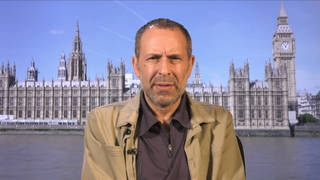
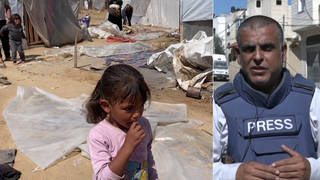
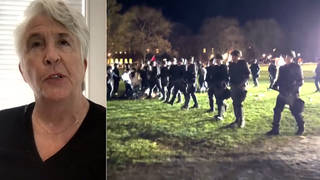






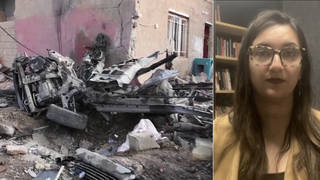
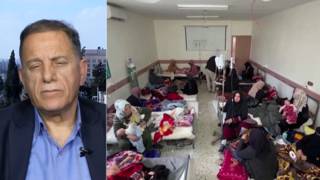
Media Options